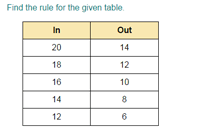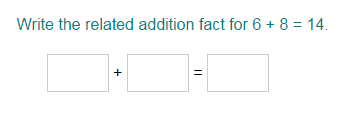Input/Output Tables
In order to identify the rule, check the complete rows of the table.
If the output is more than the input, the rule can be either addition or multiplication. If the output is less than the input, the rule can be either subtraction or division.
Remember that the rule applies to all the pairs of numbers in the table.
For example, consider the table given below.
| In | Out |
| 2 | 10 |
| 5 | 25 |
| 8 | 40 |
| 11 | 55 |
Let's find the rule using the complete rows.
Here, observe that the given rule makes each number increase, and the increase is more as the numbers get larger. So, try using multiplication.
Also, observe that:
Row 1: 2 × 5 = 10
Row 2: 5 × 5 = 25
Row 3: 8 × 5 = 40
Row 4: 11 × 5 = 55
On multiplying each of the input numbers by 5, we get their output numbers.
So, the rule is "multiply by 5."
A B C D E F G H I J K L M N O P Q R S T U V W X Y Z
Help
The correct answer is
Remember :
The smallest number is the one that comes first while counting.
Solution :
To arrange the given numbers in order from smallest to greatest, find the smallest number among all the given numbers.
21,27,23
21 is the smallest number.

